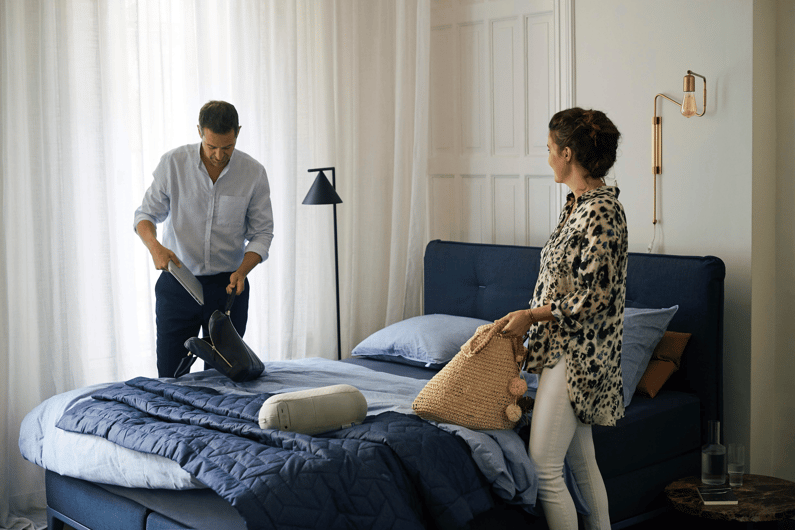
Snoring has been a topic of arguments between couples since the beginning of time. Well, it’s not documented that Adam and Eve argued about it, but it’s probably safe to assume they did. In all seriousness, snoring can be a big issue.
If you have found yourself googling phrases, like “snoring like a bear” or “snoring is ruining my life,” then this blog is for you!
What happens when you snore?
According to the National Sleep Foundation, when you sleep, muscles of your throat relax, your tongue falls backward, and your throat becomes narrow and somewhat "floppy." Then, as you breathe, the walls of your throat vibrate, which can lead to snoring. The narrower your airway becomes, the greater the vibration and the louder your snoring will be.
Let’s dive into some reasons that can sometimes contribute to snoring.
|
Type of Snoring |
What it May Indicate |
|
Closed-mouth snoring |
May indicate a problem with your tongue. |
|
Open-mouth snoring |
May be related to the tissues in your throat. |
|
Snoring when sleeping on your back |
Poor sleep habits and unhealthy lifestyle. |
|
Snoring in all sleep positions |
Can mean your snoring is more severe and may require a more comprehensive treatment. |
Ways to cope with snoring:
Wear earplugs.
If your loved one snores, you may want to invest in some earplugs, as this is a much better choice than taping their mouth shut. We are kidding of course, about the tape that is. While your partner tries various options to eliminate snoring, you should wear earplugs to block out the sounds.
Weight loss and exercise.
When you're overweight, you may have excess fatty tissue in the back of the throat that narrows the airway and makes you more likely to snore. So, if you're overweight or obese and you snore, there's a great possibility that losing weight could eliminate snoring completely.
Sleep in a separate space.
Obviously, this is not the ideal option. However, this may be the best “right now” option so that you both are getting the rest required to be healthy. Married couples sleeping in separate bedrooms actually date back to the 1800’s when one was considered royal to have their own sleeping quarters. It’s not so common now, but if it keeps you from arguing from crankiness, then it’s best to choose this temporary option until you can find a cure.
Nasal drops or nasal strips.
Taking steps to eliminate allergies or other sources of nasal congestion can help combat snoring. Breathing strips that go over the nose may help open your nasal passages during the night, as well as internal nasal expanders.
Throat exercises.
Some studies suggest that by pronouncing certain vowel sounds and curling the tongue in specific ways, muscles in the upper respiratory tract are strengthened and therefore reduce snoring. The following exercises may help:
- Repeat each vowel (a-e-i-o-u) out loud for two to three minutes a few times a day.
- Place the tip of your tongue behind your top front teeth. Slide your tongue backwards for three minutes a day.
- Close your mouth and purse your lips. Hold for 30 seconds.
- For something a little more enjoyable, simply spend time singing. Singing can increase muscle control in the throat and soft palate, reducing snoring caused by slack muscles.

Switch sleep position.
If you currently sleep flat on your back, simply sleeping on your side could help stop snoring. Sleeping on your side opens up your nasal airway passages while sleeping on your back can cause your airway to become blocked or narrowed, which causes a vibrating sound when you breathe. If you are unable to sleep on your side, try to elevate your head with an extra pillow, which may help open up your airways. Choosing an anti-snoring pillow can help to keep your head in position. The SnoreLab gives a few options to consider.
Avoid alcohol within three hours of bedtime.
Alcohol is a muscle relaxant. This can contribute to the relaxation of the airway and worsen snoring and obstructive sleep apnea. Also, talk to your doctor about any prescription medications you’re currently taking. Some encourage a deeper level of sleep, which can make snoring worse.
Sleep study.
A sleep medicine physician may suggest that the next step would be to do a home sleep apnea test, or in some cases an in-lab sleep study. A board-certified sleep physician is specially trained to diagnose sleep apnea.
Medication.
Physicians suggest recording your loved one snoring because it may help with a diagnosis. The best practice is to get permission first though. Snoring can often lead to embarrassment and recording without a heads-up may stir up anger.
Anti-snoring mouth appliance.
These devices look similar to an athlete’s mouth guard. They can help open your airway by bringing your lower jaw and/or your tongue forward during sleep. While a dentist-made appliance can be expensive, you could opt for the do-it-yourself kits that will help you pinch some pennies.

Oftentimes, snoring can be dismissed as a natural part of aging. While it’s true that this noisy condition can increase over time with age and weight gain, it should not be accepted without attempting to figure out the cause.
Getting enough sleep is vital to your health.
There are additional health risks from lack of consistent high-quality sleep, including being more prone to accidents, difficulty focusing, impaired attention, and alertness, as well as other serious risks, such as heart disease, stroke, and diabetes. This lack of sleep can promote weight gain while also accelerating the aging of the skin and brain.
If you or your partner is a frequent loud snorer, stops breathing, gasps or chokes during sleep, experiences excessive restlessness at night or feels excessively sleepy during the day, you may want to bring it up with your doctor to see what your first step should be.
If you’ve found something that has worked in your situation, please comment with your remedy. Some say the first night their partner didn’t snore, they feared they had died. Peaceful sleep is important and restful sleep is priceless. You need both.
Which coping option will you try first, or which have you already tried?
If you need to see a doctor and don’t currently have health insurance, Open Enrollment ends December 15, 2020, but with Impact Health Sharing there is no enrollment period. You can get a quote and apply any time!
To chat with someone without having to deal with pushy brokers, please visit our website.
If you want to lose weight to help you sleep better, read our tips that will help you feel fuller longer.

